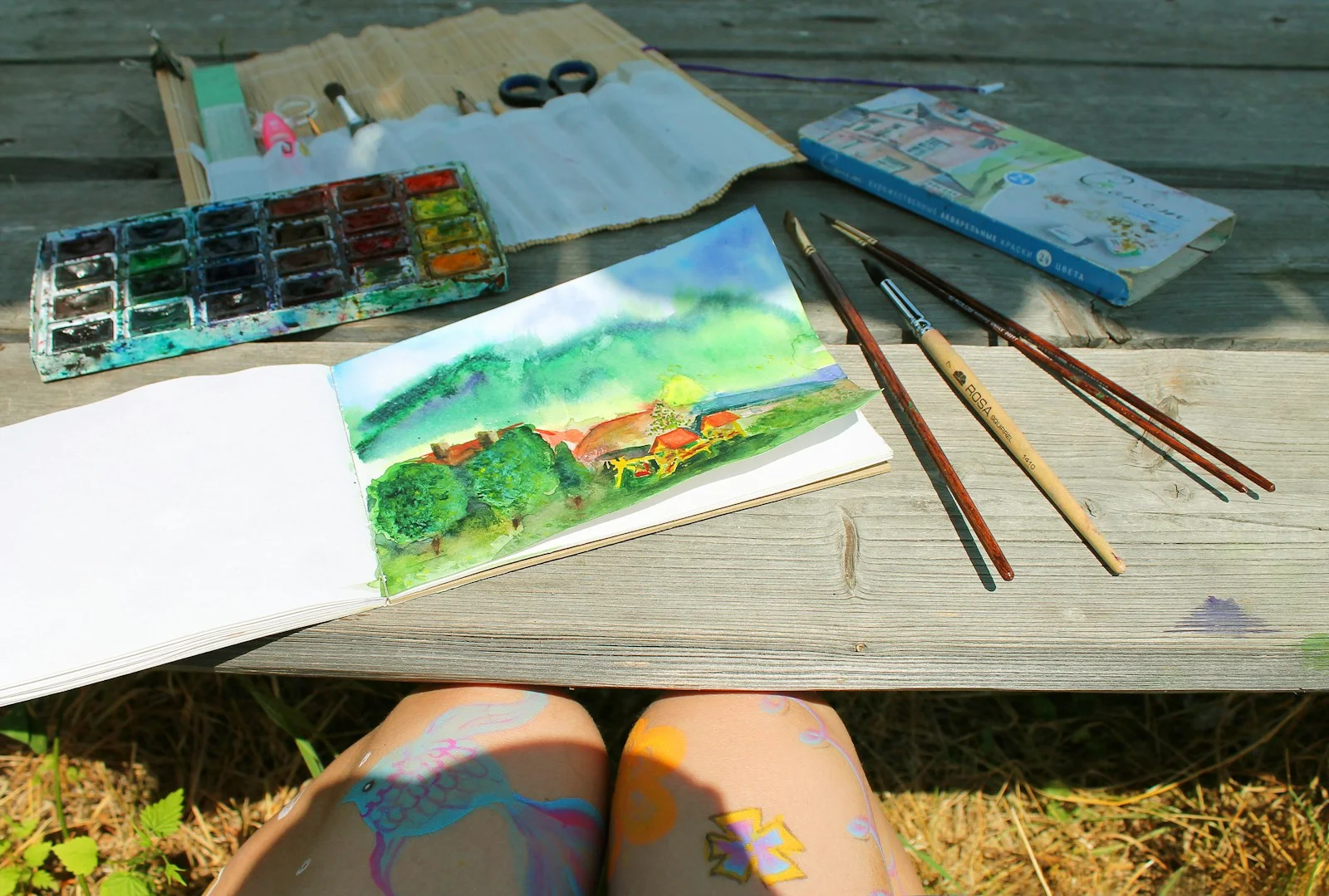
You’re wasting precious time wandering through life without a passion that truly energizes you, and I can tell you from experience that finding the right hobby isn’t just luck—it’s a systematic process. Most people randomly jump from activity to activity, hoping something will stick, but that approach leaves you frustrated and empty-handed. There’s actually a proven method to identify hobbies that’ll captivate you for years, and it starts with understanding yourself better than you ever have before.
Assess Your Current Interests and Natural Inclinations

Before you dive headfirst into browsing endless hobby lists online, you need to take a hard look at what already sparks your curiosity in daily life. I can tell you from experience, the answers are hiding in plain sight. Notice what makes you stop scrolling on social media – cooking videos, woodworking projects, or fitness transformations. Pay attention to what sections you gravitate toward in bookstores, what YouTube rabbit holes consume your evenings, what conversations energize you most.
I’ve never seen someone succeed long-term with a hobby that fights against their natural wiring. If you’re naturally detail-oriented, consider model building or jewelry making. If you’re physically restless, explore hiking or martial arts. Your perfect hobby amplifies who you already are, it doesn’t force you into someone else’s mold. Whether you’re drawn to creative pursuits like learning photography or intellectual challenges like learning to code, the key is matching activities to your inherent strengths and interests.
Evaluate Your Available Time and Schedule Constraints
Now that you’ve identified what naturally draws your attention, you need to face a reality check about your actual schedule. I can tell you from experience, most people overestimate their available time by at least 50%. You’re not different.
Start by tracking your week honestly. Write down everything: work, commuting, family obligations, sleep. I’ve never seen someone who didn’t discover hidden time drains they’d forgotten about.
Next, decide what you’re willing to sacrifice. That hobby requires real hours, not leftover scraps. If you want woodworking but only have 30 minutes twice weekly, you’ll get frustrated fast. Match your time reality to appropriate activities. Someone with two hours on weekends needs different hobbies than someone with daily hour-long slots.
Consider using time limits for each hobby session to maintain focus and avoid letting your new interest consume more hours than you’ve allocated.
Determine Your Budget and Resource Limitations
After you’ve mapped out your time, money becomes the next harsh reality. I can tell you from experience, hobbies can drain your wallet faster than you’d expect. Start by setting a hard monthly limit you won’t cross, no matter how tempting that expensive equipment looks.
Hobbies will empty your wallet faster than you think—set a strict budget and stick to it religiously.
Consider startup costs versus ongoing expenses. Photography might need a $500 camera upfront, but hiking just requires decent boots. I’ve seen people abandon expensive hobbies because they couldn’t sustain the monthly drain.
Don’t forget hidden costs like storage, maintenance, or membership fees. That pottery wheel needs space, and golf clubs need regular replacement.
Be brutally honest about what you can afford long-term. Your perfect hobby won’t stay perfect if it creates financial stress. Many creative hobbies like jewelry making or woodworking can actually transform into home-based businesses if you develop the skills and find your work in demand.
Identify Your Learning Style and Preferences

Money’s only half the equation when choosing your hobby. You need to understand how you actually learn best, or you’ll waste time spinning your wheels.
I can tell you from experience, visual learners dominate hands-on hobbies like woodworking, painting, and mechanics. If you grasp concepts by watching demonstrations, these’ll click fast.
Auditory learners crush it with music, podcasts, and discussion-based activities like book clubs or debate groups.
Kinesthetic learners need movement and touch. I’ve never seen them satisfied sitting still – they excel at sports, dancing, martial arts, and crafting.
Consider your patience level too. Some people thrive on instant gratification hobbies like cooking or sketching. Others prefer long-term projects like gardening or learning languages.
For those with ADHD, choosing hobbies that align with your brain’s unique ability to focus intensely on activities of genuine interest can lead to exceptional engagement and skill development.
Match your natural learning style with compatible activities, and you’ll accelerate your progress dramatically.
Consider Your Physical Space and Equipment Needs

Before you fall in love with a hobby, take a hard look at your living situation. I can tell you from experience, nothing kills passion faster than cramming a pottery wheel into a studio apartment or trying woodworking without proper ventilation. You’ll end up frustrated, defeated, and probably broke.
Start by measuring your available space honestly. That corner you think looks perfect mightn’t accommodate a sewing machine plus cutting table. I’ve seen too many people abandon expensive hobbies because they underestimated their spatial needs.
Consider noise restrictions too. Your apartment neighbors won’t appreciate late-night guitar practice, and HOA rules might prohibit outdoor welding projects. Match your hobby’s physical demands to your actual living constraints, not your fantasy workspace.
If you’re considering hobbies that require a dedicated workspace, think about investing in multi-functional furniture that can serve double duty when you’re not actively pursuing your craft.
Explore Activities That Align With Your Personality Type
Why do some people thrive with intricate model building while others get restless after five minutes? Your personality type drives what activities will energize versus drain you. I can tell you from years of observation that matching hobbies to your natural wiring creates unstoppable momentum.
Here’s how to identify your perfect match:
- Introverts: Choose solitary pursuits like writing, painting, or woodworking that allow deep focus without social pressure
- Extroverts: Seek group activities like team sports, book clubs, or community theater where you’ll feed off others’ energy
- Detail-oriented types: Gravitate toward precision hobbies like jewelry making, coding, or genealogy research
I’ve never seen someone stick with a hobby that fights their natural tendencies. Stop forcing yourself into activities that feel wrong, start embracing what feels authentic to who you are. Once you’ve found your ideal hobby, dedicate just five minutes daily to practice—this creates compound growth that transforms casual interest into genuine expertise over time.
Take Quiz 🎨 What Hobby Suits You?
🎨 What Hobby Suits You?
Discover your perfect creative passion in just a few clicks!
How do you prefer to spend your free time?
What’s your ideal weekend vibe?
Which superpower would you choose?
What motivates you most?
Your perfect workspace would be…
When facing a challenge, you prefer to…
What kind of progress makes you happiest?
Your ideal way to relax after a stressful day?
What would make you feel most accomplished?
When you were a kid, you probably loved…
Creative Arts & Crafts
You’re meant to create! Whether it’s painting, photography, jewelry making, pottery, or digital art, your soul craves self-expression. You find peace in the process and joy in bringing something beautiful into the world. Consider hobbies like watercolor painting, knitting, woodworking, or even learning a musical instrument!
Active & Outdoor Adventures
Your body needs to move and your spirit craves adventure! You thrive on physical challenges and love being in nature. Perfect hobbies for you include hiking, rock climbing, cycling, martial arts, dancing, or team sports. You might also love activities like gardening, kayaking, or even training for marathons!
Learning & Mental Challenges
Your mind is your playground! You love diving deep into subjects, solving puzzles, and constantly growing your knowledge. Perfect hobbies include learning new languages, chess, coding, astronomy, genealogy research, or collecting and studying something that fascinates you. You might also enjoy writing, blogging, or starting a podcast!
Research Potential Hobbies Through Online Resources
Once you’ve identified your personality type and natural preferences, the internet becomes your most powerful tool for discovering hobbies that’ll actually stick. I can tell you from experience, you’ll save months of trial and error by leveraging online communities first.
Start with Reddit’s hobby-specific subreddits where real practitioners share honest insights about costs, time commitments, and learning curves. YouTube channels offer visual previews of techniques and equipment demonstrations. I’ve never seen anyone regret spending two hours researching before investing hundreds in supplies.
Check hobby forums for beginner guides and local meetup groups through Facebook or Meetup.com. Pinterest reveals project complexity levels through photos. Don’t skip reading Amazon reviews on starter kits, they’ll reveal hidden expenses and common frustrations that could derail your progress before you begin.
Look for online tutorials and communities that provide endless learning resources, especially for digital art where beginners can experiment with software before committing to expensive equipment.
Try Low-Commitment Taster Sessions or Beginner Classes

The smartest move you can make after your research phase is testing hobbies through short-term commitments that won’t drain your wallet or schedule. I can tell you from experience, jumping into expensive long-term courses without sampling first leads to costly regrets.
Testing hobbies through short-term commitments saves your wallet and prevents the costly regrets of jumping in too deep too fast.
- Book single “try it” sessions – Most studios offer one-time classes for pottery, dance, or martial arts at fraction of monthly rates
- Attend free community workshops – Libraries, community centers, and hobby stores regularly host beginner sessions for crafting, coding, or gardening
- Join short-term challenges – Participate in 30-day photography projects or weekend hiking groups before committing to expensive gear
Many aesthetic hobbies like pottery and ceramics offer beginner-friendly sessions where you can test your interest before investing in wheels, kilns, and glazing materials. I’ve never seen anyone regret testing waters first. These low-risk experiments reveal whether you’ll actually stick with something long-term, saving you serious money and disappointment.
Connect With Local Communities and Interest Groups
Beyond sampling different activities, you’ll want to tap into existing communities where enthusiasts gather regularly. I can tell you from experience, these groups become your fastest pathway to mastery and genuine enjoyment.
Start with Facebook groups, Meetup apps, and community center bulletin boards. You’ll discover hiking clubs, book clubs, photography walks, and craft circles happening right in your neighborhood. I’ve never seen someone struggle to find their groove when they’re surrounded by passionate people who share their interests.
Local libraries often host hobby-focused events, while hobby shops typically know which groups meet weekly. Don’t underestimate the power of simply asking employees at relevant stores—they’re connected to the most active communities. These connections transform casual interests into serious pursuits that stick.
Spring offers particularly rich opportunities to connect with others through farmers’ market meetups, outdoor yoga sessions, and seasonal crafting groups that emerge as the weather warms.
Start Small With Basic Equipment and Simple Projects

While enthusiasm might tempt you to buy every tool and tackle complex projects immediately, I can tell you that starting small protects both your wallet and your motivation. I’ve seen too many people burn out because they overwhelmed themselves with expensive gear and ambitious first attempts.
Smart hobbyists take control by following this proven approach:
- Buy one essential tool at a time – Master each piece of equipment before adding more to your arsenal
- Choose beginner projects with clear instructions – Success builds the confidence you need to advance
- Set a modest budget for your first month – This forces you to focus on fundamentals rather than flashy extras
You’ll gain real skills faster when you’re not distracted by complexity. I can tell you that mastering basics creates the foundation for everything that follows. Just like entrepreneurs who create detailed documents outlining their strategy and goals to secure funding and stay organized, having a clear plan for your hobby development helps you identify potential challenges and allocate resources effectively.
Track Your Progress and Enjoyment Levels
As you plunge into your new hobby, keeping a simple record of your progress transforms scattered efforts into meaningful growth. I can tell you from experience, tracking what you’re doing creates powerful momentum that casual hobbyists never achieve.
Start with a basic notebook or phone app. Record what you accomplished each session, how long you spent, and rate your enjoyment from one to ten. I’ve never seen anyone regret documenting their journey this way. After two weeks, patterns emerge clearly. You’ll spot which techniques energize you, which projects drain your enthusiasm, and where you’re actually improving.
This data becomes your compass. When you see consistent low enjoyment ratings, pivot immediately. High scores with steady progress? Double down on those activities and watch your skills accelerate.
Commit to Regular Practice and Skill Development

The difference between casual dabbling and genuine skill development lies in one simple commitment: showing up consistently, even when motivation fails you. I can tell you from experience, the people who achieve mastery aren’t necessarily more talented—they’re just more disciplined about practice.
Here’s your roadmap to skill development:
- Schedule specific practice times and treat them like non-negotiable appointments with yourself
- Start with 15-20 minute sessions to build the habit without overwhelming your schedule
- Track your improvements weekly by documenting what you’ve learned or accomplished
I’ve never seen someone regret investing time in developing a skill they love. The compound effect of regular practice transforms beginners into experts faster than you’d imagine. Consistency beats intensity every single time.
Conclusion
You’ve got everything you need to find your perfect hobby now. I can tell you from experience, the key is taking that first step and actually trying something new. Don’t overthink it or wait for the perfect moment. Pick one activity that sparked your interest, set aside some time this week, and plunge into it. Your future self will thank you for starting today instead of waiting.





Social & Community Activities
People are your passion! You light up when connecting with others and love being part of a community. Great hobbies for you include joining clubs, volunteering, organizing events, board game nights, book clubs, cooking for friends, or even getting into theater or improv. You might also love teaching, mentoring, or starting a support group!